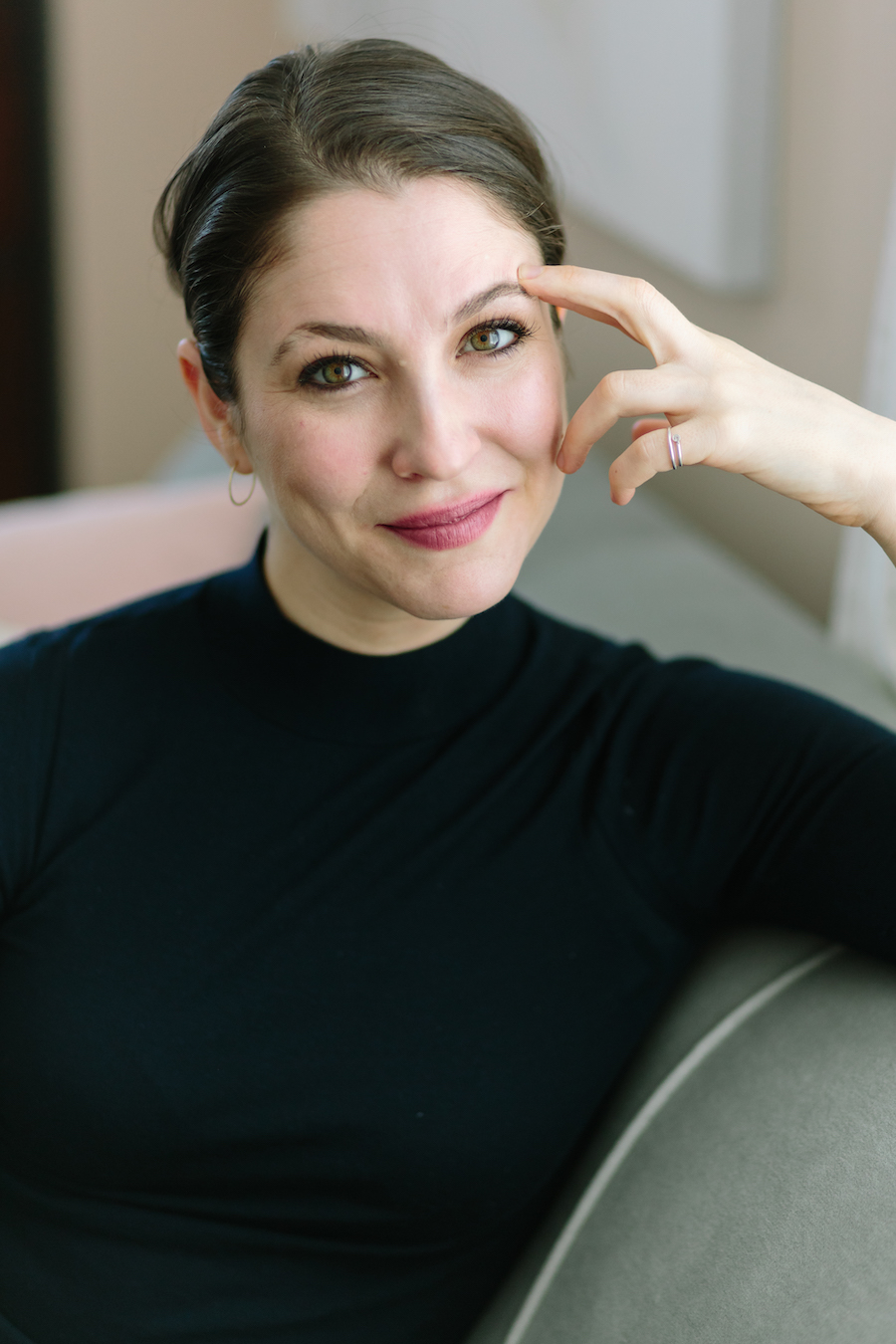Now, let’s learn from our second guest…
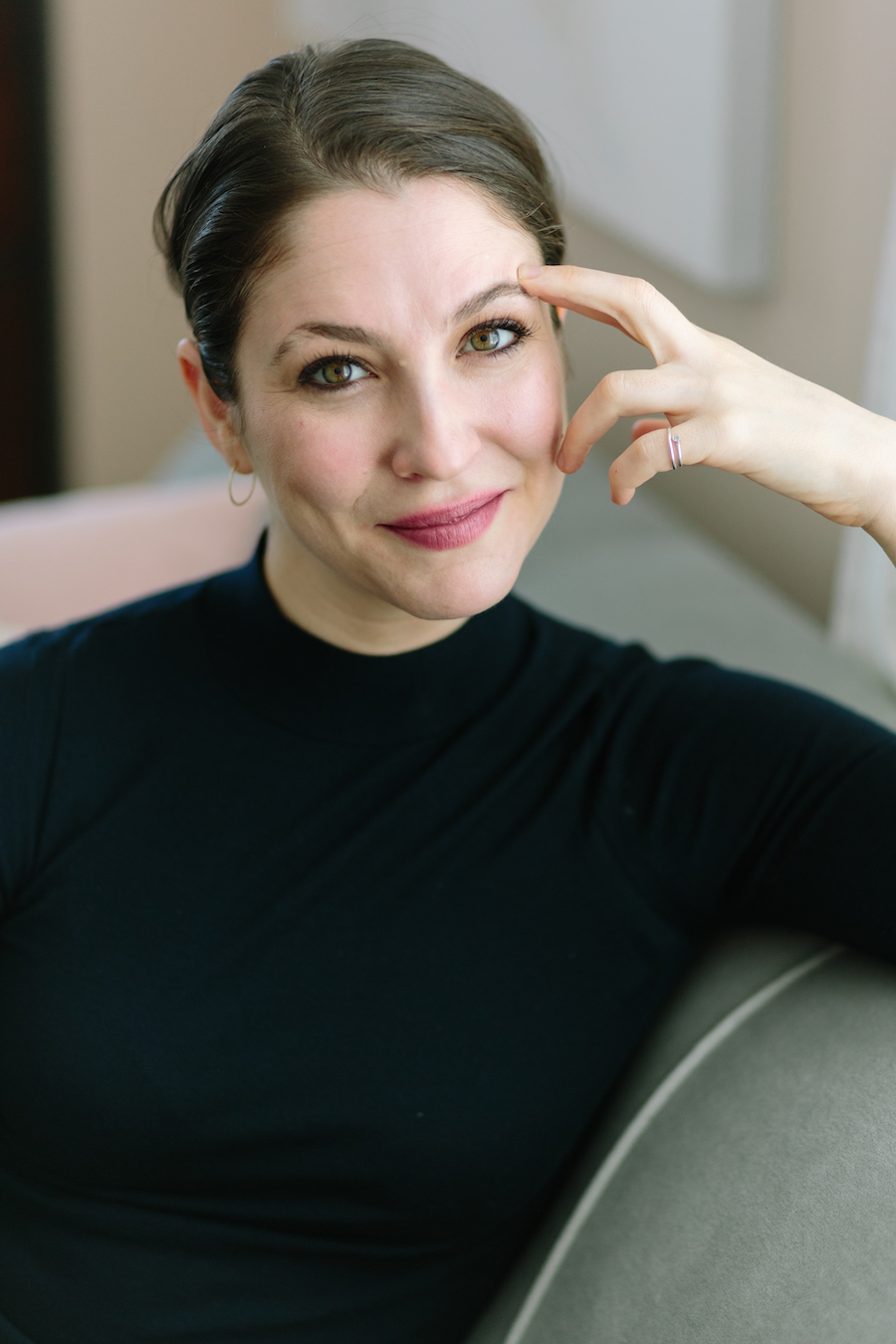
Loneliness Expert and Founder of Small Packages, a curated care package company working to end the loneliness epidemic,
JULIE SCHECHTER Spotlight
1. Weeks into quarantining, with more silence and less distractions, is there something that you feel like you are being called to face? Maybe a feeling about yourself that you can no longer outrun, a fear that has been exacerbated, a dependency that’s been crippling you, a relationship that you realize you’ve been neglecting?
I have been ignoring my body for so long. As a start-up founder, there is literally no end to the amount of work I can do and almost all of it needs to be done in front of a computer. I looked fine, but I was eating whatever and moving only when I absolutely had to, and I felt a constant low-level hum of physical anxiety.
I’m a former ballet dancer, and my first company was fitness-based, so this disconnect just felt wrong. Even when your pants still fit, you can feel sick and disconnected from your physicality in a way that cripples your confidence and sense of calm.
I think this is something that all start-up founders struggle with: we’re so in love with our companies that we turn over all our resources—our time, our health—without a second thought. But now that I don’t have outside stimuli to keep distracting me, I can hear the alarm bells going off even louder: the lack of sleep is clouding my focus, and my limbs feel heavier and tighter.
The moment my physical footprint got smaller, the more I could feel how off I felt inside.
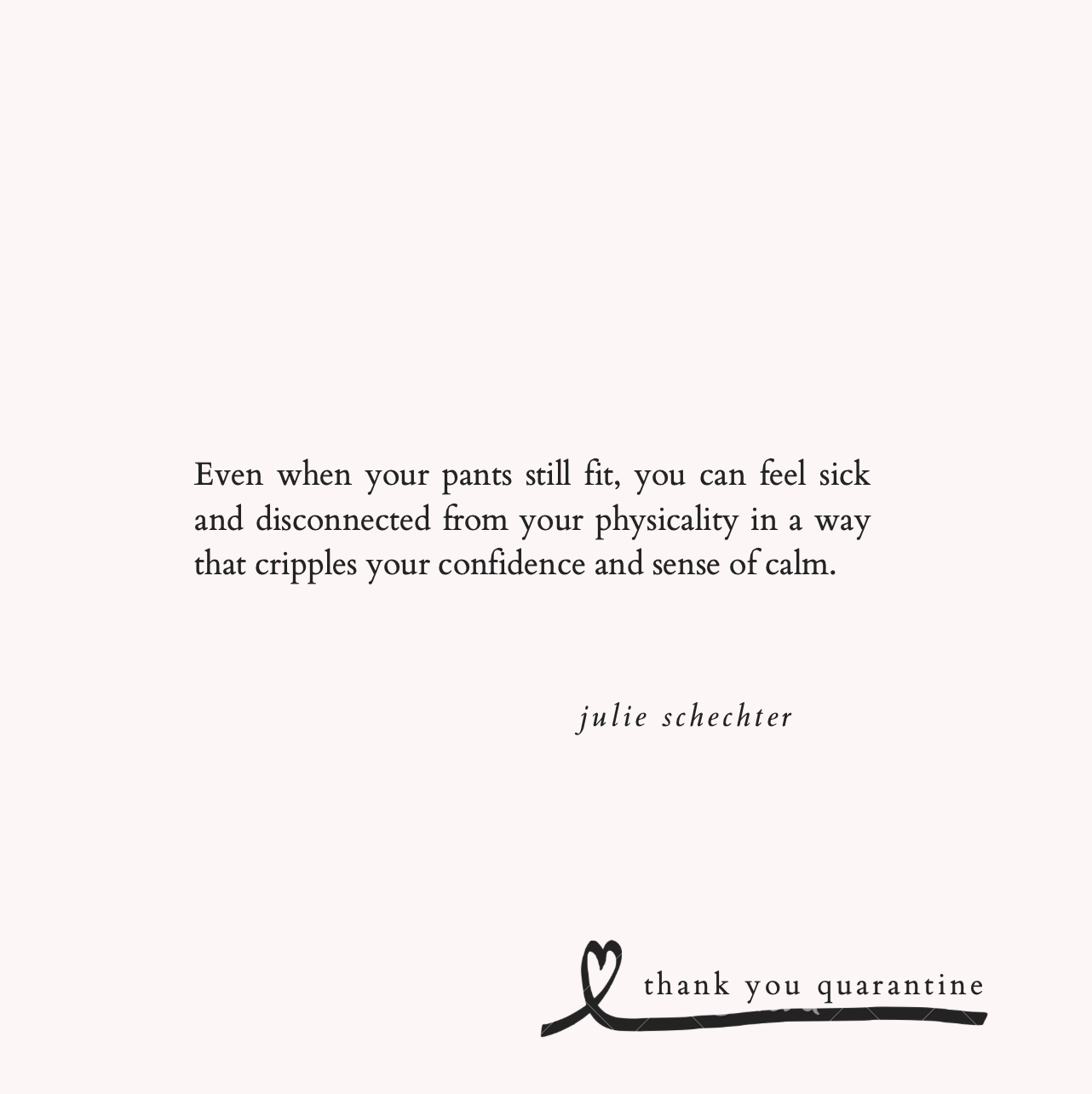
2. If you turned this period of quarantining into one long personal development project, where would you most need to breakinward in order to look back and say, “That time benefited me and I emerged healed and stronger in thanks to the pandemic”?
I would need to carve out time. It sounds a little upside down, given that we aren’t going anywhere, but it’s still totally possible for me to work all day without being physical. In this time when the economy is uncertain, and I’m trying to rework our supply chain, it would be very easy for me to go into “emergency mode” and never look up from my screen.
But I don’t want to come out of this experience in the same state I went in. I want to set boundaries between my life and my work, to make a conscious decision that protecting my health is my first priority. I will be stronger (as a business owner, as a human) if I reattach the link between my body and my mind. It’s a muscle I haven’t used in so long, but if I can strengthen it during time of isolation, I’ll be able to walk back into the normal world with increased clarity and power.
3. What is the most poignant memory you have of feeling isolated in your life? How did you breakthrough that isolation and eventually reengage with the world?
I went through a rough period during the first year of law school when I felt completely isolated. I was trying to keep up with the actual demands of being a 1L (unending reading, feeling panic about being called on at any time in class, and needing to sound like I knew what I was talking about) but I’d also turned over a huge part of my identity to the idea of succeeding in the high-intensity environment. I stopped talking to my non-law school friends as much, not because I didn’t love them, but because they couldn’t identify with the crazy-high stakes I felt like my life had taken on: I had to “make it” here or else.
My world shrank to the physical limits of my apartment, the law library, and the classroom; I went months during that winter where I didn’t go outside those three spaces (grocery delivery is both a blessing and a curse). I started to lose perspective on what I had always cared deeply about (the people I loved, the social issues that had prompted me to go to law school in the first place) and began to feel totally alone.
It took the second round of finals to break me of that feeling.
I had never felt that level of pressure before, but I distinctly remember walking outside after my last test ended and hearing a small voice say, “Never again.”
In the same way your body sometimes breaks down and gives into illness after a period of intense stress, mine gave to craving for social contact. I went home to LA, and spent the summer rebuilding all the connections with friends I’d ignored during that first year. Every time I heard them pick up the phone, or saw them walk into our favorite bar, my blood pressure ratcheted down a notch.
It’s always a process, not letting outside forces strangle the bonds you care about most deeply; but it’s one to which I’m now deeply committed.
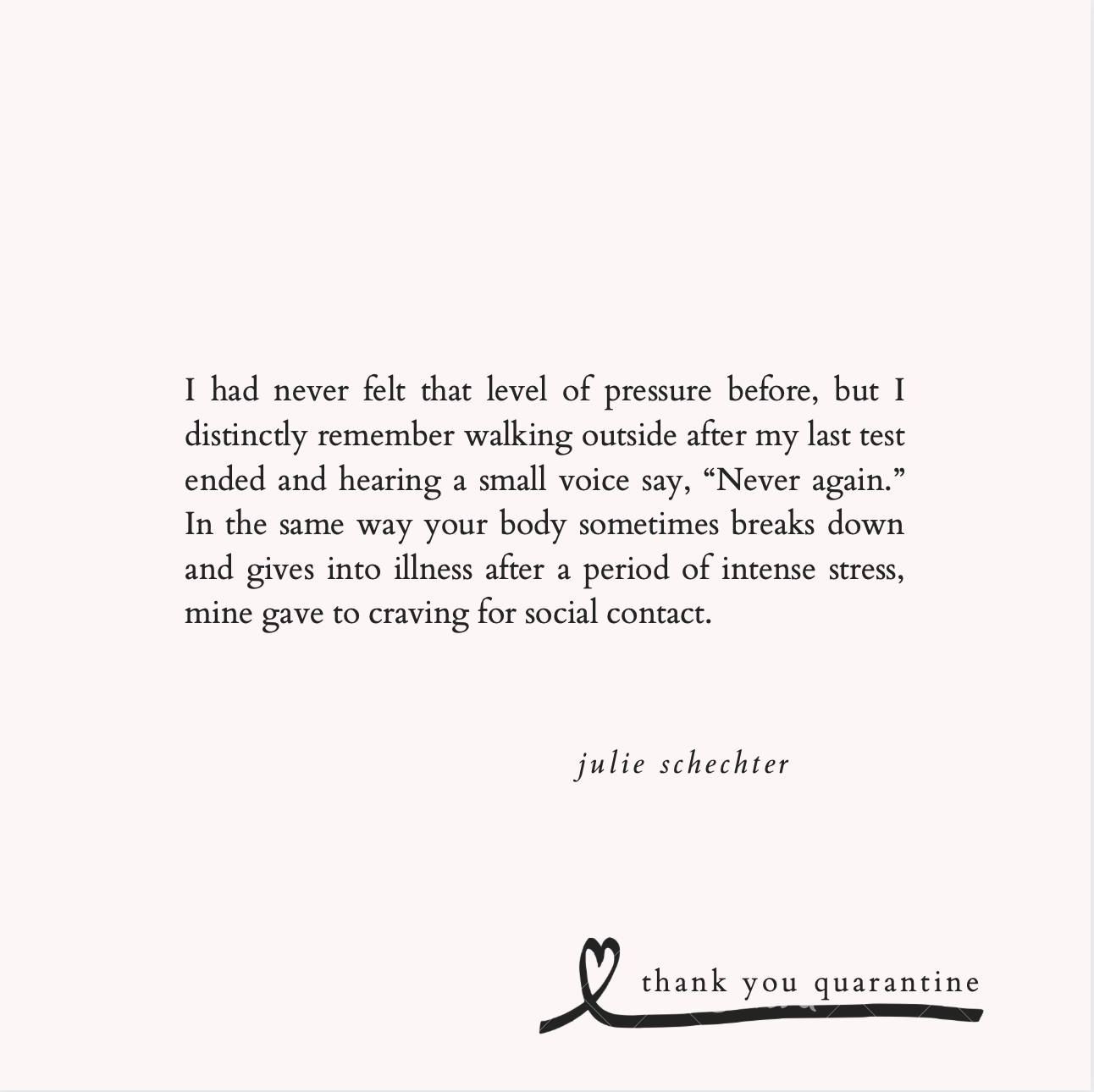
4. As you practice self-isolation and physical and social distancing, what and/or who are you missing most from your “old life?”
I’m missing the freedom to walk among other people, without even interacting with them. One of the reasons I love New York so much is that you can never really be lonely; even if you don’t have someone to spend time with on a given day, you can just go out into the city and let it swallow you up. You can walk from Harlem to the Lower East Side, just meandering through the streets, stopping to get a coffee, listening to the snippets of conversation as you pass people. You can people-watch until your eyes get heavy, imagining the lives of all the characters who belong to the zillion versions of New York that sit on top of each other.
5. In a perfect world, where life resumes to normal, what would the perfect day look like to you? Who would you see, what would you do, where would you go, how would you act? And would this look and feel any differently than days of the past?
In a perfect world, my “normal” would go back to what it looked like before: a staggering amount of human interaction.
I am a textbook extrovert, and I gain energy from being around other people. Even though I work (mostly) by myself, I always get up and out of my home: to the coffee shop, to chat with the barista and work for a few hours, to the coworking space to see the other women who are also building businesses, to drinks with one friend, to dinner with another. I am my absolute happiest when I crash in bed late at night (I might want to try to work on that part…) with all the conversations I’ve had throughout the day still ricocheting through my brain.
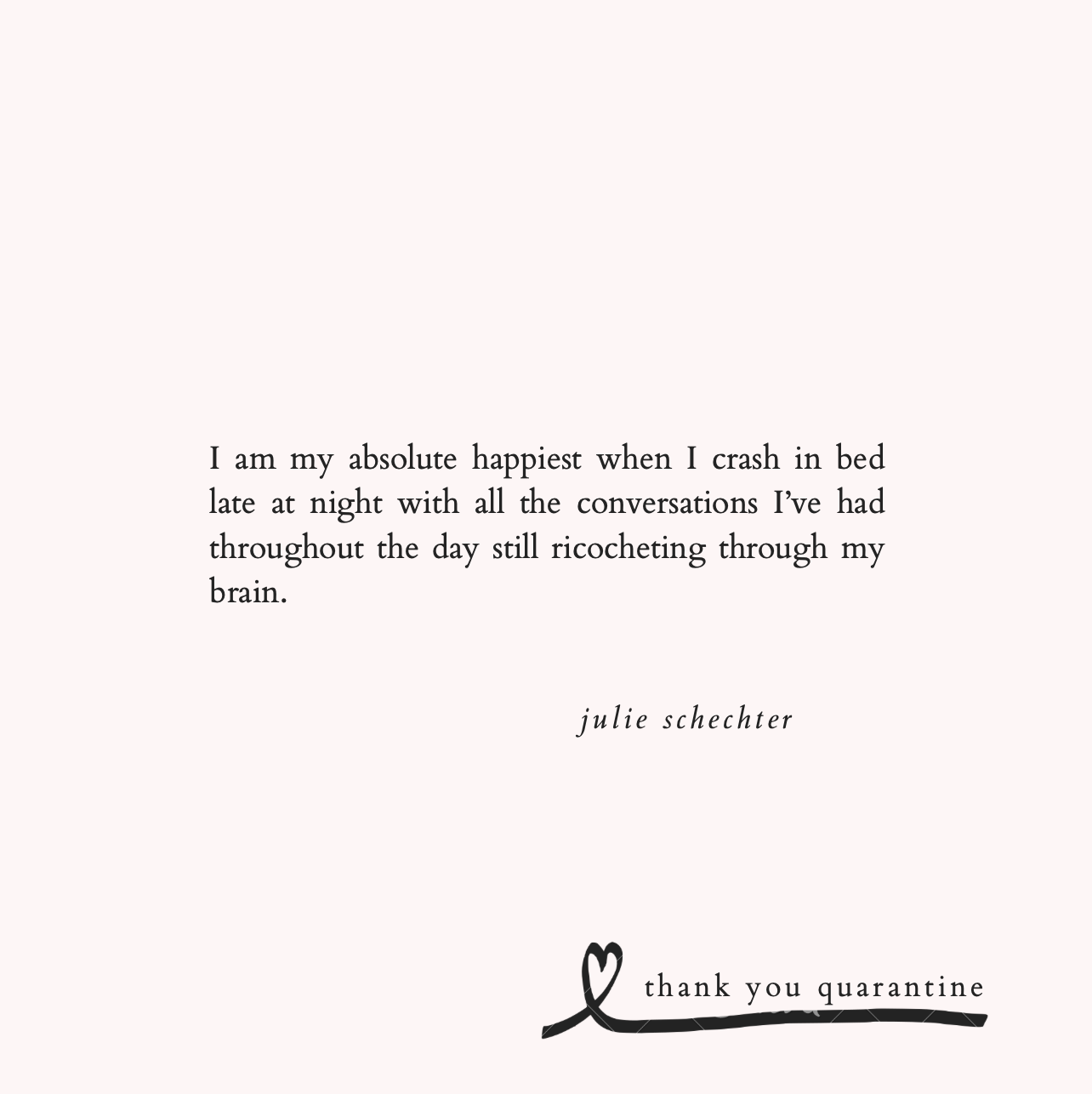
6. What is the upside of solitude and why do we work so hard to avoid it? What question do you have about your life that bubbles to the surface when you’re in solitude? Is there a question you feel like others keep busy in order to avoid having to ask themselves?
I think the noise of daily life is helpful in distracting us from the nagging feeling that there’s something else we need to attend to. We have a feeling that that there’s going to be real work waiting for us, and we’re all human: we’d rather not do the work, if we don’t have to.
But I think the beautiful thing is that in solitude, when we let all that noise fall away, we often find that the work isn’t as strenuous as we think it’s going to be. It’s often almost easy, so long as you’re fully in it; it turns out the hard work is the act of juggling, not the act of attention.
7. How would you define freedom? When do you feel most free?
To me, freedom means independence. I find it’s often in the minutiae: I’m very physically restless, and I can’t stand sitting for long periods of time. Desk jobs, where I didn’t really have control over my own schedule, were really rough. I took way too many coffee breaks (which maybe explains part of my caffeine addiction) and often got in trouble when people “couldn’t find me.” I thought there was something wrong with the way I worked, until I started my own business, and found that I actually could be completely responsive to the needs of the people with whom I had to communicate; I just couldn’t handle someone else making judgments about the best way for me to manage my own body and schedule to achieve a certain outcome.
8. What are you learning about the importance of self-reliance as well as physical touch?
My feelings on self-reliance are sort of bifurcated. I’m a solo founder, so I can’t rely on anyone else to pick up the slack professionally. At the same time, I’ve always been very aware of how important my relationships are to my mental health.
Being socially distant from others has reinforced what I already knew: that I can depend on myself to accomplish anything I need for survival, but I’ll really feel the lack if I don’t have emotional support.
The same goes for physical touch. I find it crucial to my happiness, and it’s something I’ve always prioritized. In previous moments where it became less available (after breakups, when moving to a new city) I tried to get massages as often as possible. I realized in those moments that, while the intention behind the touch is wonderful, it’s possible to reap a significant amount of the benefit with just the motion. Of course, in this moment, that isn’t possible: all massage spots are closed. So, I’m going back to the basics: simulating some of the same feelings with stretching and foam-rolling. Getting super grounded in your physicality can have some of the same pay-off.
9. What’s a moment that you’ve really enjoyed since quarantining?
I had a wonderful night where I discovered my roommate and I both love (and I mean love) musicals. We have this whole shared history as musical theater kids, and we’d just never talked about it. We’d ordered a pizza, were most of the way through a bottle of wine, and she happened to land on Nine on Netflix. She asked if I’d seen it (I hadn’t) and then somehow it was 2am and we were belting our way through Rent (which we both remembered word for word). I remember looking over at her on the couch, both of us dancing around like idiots to La Vie Boheme, and thinking, “Huh. This might not have happened otherwise.”
10. When the going gets tough, what’s one mantra you’d like to try and live by?
“Everything you want is on the other side of fear.” I keep feeling frustrated with this period, because I am the consummate do-er; I can handle any setback as long as I’m allowed to get back up and keep running. But when I have to stay still, I’m pushed outside my comfort zone, and I find it incredibly challenging. The fear I’m grappling with in this situation is that my momentum is being taken away from me, that I’m not going to be able to get it started again. But, of course, what that fear is making me realize is that I’ve gotten overly attached to this particular path I’m on. Now I have to ask myself, “What if you do have to set down this momentum and start again?” Asking that question, and seeing that I’ll find a way to make it work no matter what that next phase looks like, allows me to put my head down and keep moving even in stillness.
JULIE SCHECHTER is the founder and CEO of Small Packages, a curated care package company working to end the loneliness epidemic. In her work as a relationship wellness expert, she focuses on loneliness and millennial isolation, and how we can maintain strong long-distance connections with our networks. She has been featured by The Everygirl and Elite Daily, worked with Glamour Magazine’s Women of the Year Gala, and was awarded a Visionary Women Grant by Shark Tank’s Barbara Corcoran and iFundWomen. She is a former attorney and graduate of Harvard Law School.


